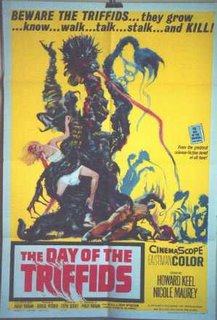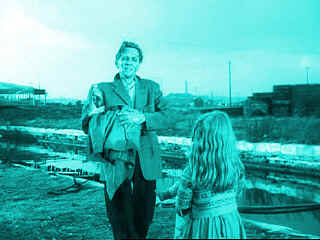 "If this is living in the future today... I'm all for it."
"If this is living in the future today... I'm all for it."

I've never really been a fan of Gerry Anderson and his various miniature and not so miniature extravaganzas. There's a horrid air of 'gadget' hanging over them that stifles any interesting ideas they might have. For me they're always like watching a piece of pornography made for a fetish I don't have: Where there should be a shot of an actors reaction there instead is a ponderous sequence involving some spaceships or some such; where there might be a long short of the couple 'doing it' instead there is a lingering close-up of a toe... Wholely unsatisfying to me, but obviously targeted at the taste of someone, somewhere.
I couldn't resist, though, flagging up this little snippet of Sylvia Anderson trying to pass off the clothes that the women wear in 'UFO' as practical fashions. According to the obsessively neat and categorized 'UFO' fansite the clip is from, it comes from a 1970 UK TV programme "Tomorrow Today". It's interesting how much it betrays of Sylvia Anderson's attitude to actors versus puppets. To quote her: "With puppets one could decide what body, what hairstyle a puppet has exactly, how they would dress and so on. You're a little more inhibited with an actor. You can't change a tall man into a short man."
To Sylvia, it seems, all is about appearance. That's the peculiar emptiness of the Anderson canon, I suppose.
In many ways, 'UFO' is the opposite of what I'm trying to connect with on this blog. It sits in isolation, a collection of gadgets and gimmicks that don't go any further than themselves. It doesn't manage to either create an alternative world or comment on this one, it just exists for the length of time an episode lasts then vanishes. From what I remember of watching it, it was like those action comics where a world was erected for the purposes of housing six pages of inky story and then collapsed again, all of the backgrounds hastily drawn and generic, the locations sketched in very quickly. I suppose what I can't see is the point at which the world of 'UFO' jumps off from this one, our 'real' world. I very much like the idea of fictions as 'secondary realities', realities that are like our world but have deviated at certain points.
What is great about this clip, at least, is the seventies future-ness of it. At one point the model in her spangley, stretchy nylon and PVC is seen in a clothes shop not a million miles away from record shop that we see Alex in 'A Clockwork Orange' (see this post for more). What is also great is the job we see our futuristic model at, all whirring tape wheels and grey enameled computer appliances.
It's a good example of the ephemera of something being far more interesting than the thing itself.
Posting up stuff like this wanders very close to what TVCream would call 'the wrong sort of nostalgia', taking the past out of context and applying a sort of cynical jokiness to it all. It's difficult to define the wrong sort of nostalgia but you know it when you see it or hear it. It reduces the past to 'blimey, weren't they all unsophisticated, they must have known how daft this would all look in a few years time'. It is ahistorical, because it assumes that the way things seem now is the way they must have seemed then, applying the notion of ironic knowingness retrospectively. It judges everything against the sophisticated 'now' and finds it wanting.
All that said, there's also a great futuristic car / freezing cold back road sequence to be cherished. A Sylvia says: "Modern design is very practical"...
UFO fansite: http://ufoseries.com/
Technorati Tags: science fiction gerry anderson british television









